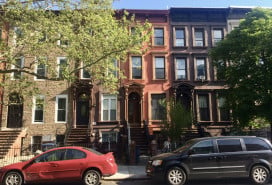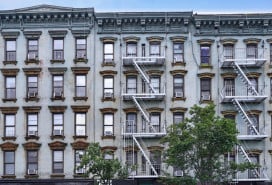Don't know what a lot line window is? You should

You’ve probably noticed brick-covered openings in facades of New York City buildings, but perhaps you haven't paid much attention to these once-functioning windows, referred to as “lot line” windows.
If apartment buying is in your future, you should at least learn the basics.
Here's what you need to know.
What exactly is a lot line window?
A lot line window abuts the “lot line” or invisible property line between two buildings, and it is deemed a lot line window by the Department of Buildings. Lot line windows are required to have fire-rated glass (glass that has been tested and acts as a barrier to flames and smoke), which distinguishes them from non-lot line windows.
"If a wall is close to some extent to a property line and there is a window in that wall, it needs to be protected," says Gordon Kahn, a New York City architect.
The window needs special glass or even a sprinkler head nearby to prevent the spread of fire. It depends on "the age of the building, how far other buildings are from it in all directions including straight down, whether it’s a commercial building or a residential building and various other criteria," says Kahn. "The criteria is established by the building code and is subject, to some extent, to interpretation, like all code things. The distance is variable depending on the building, adjacent buildings and the building’s use."
What’s the issue with having a lot line window in my apartment?
Lot line windows don’t affect you as an apartment dweller unless your neighbors build up to the level of your apartment or higher. You'd then be required to close up the window at your own trouble and expense, losing both natural light and view.
"When purchasing an apartment with lot line windows, it means that the view and light it provides are, in theory, temporary," explains New York City appraiser Jonathan Miller of Miller Samuel. "Temporary may mean 6 months or 60 years but it is not a protected view or source of light."
Who should be concerned with lot line windows?
“Every person purchasing an apartment should look at this question," says closing attorney Karen Sonn of Sonn & Associates, pointing out that lot line windows are not just Manhattan high-rise phenomenon. "There are lot line windows all over the city--uptown, downtown, Brooklyn, and Long Island City.”
Areas of the city with new high-rise developments may appear to be more risk than those without, but this is not necessarily true.
"It is tricky to make generalizations," says Sonn. "The key is to check, check, and check again."
How do you tell if an apartment has lot line windows?
"In new developments, lot line windows are usually disclosed in the offering plan," says Sonn. Older plans, in older buildings, frequently don't. “Look at propertyshark.com to check a potential building. You can tell if it’s built to a lot line.”
Most lot line windows often have chicken wire in the glass which helps "prevent the spread of fire from building to building as required by the code," says Kahn, who also recommends that buyers check with the Department of Buildings for the presence of a lot line window. "Wire glass and other glass without wire can be used to comply. The idea is for it to take fire longer to break and breach a lot line window."
Also, notes real estate broker Deanna Kory of Corcoran, most lot line windows are on the sides of buildings. "They are rarely if ever on the front and not usually on the back," she says.
Some lot line windows are not so clearly visible--they may look more like a normal plain glass window without the chicken wire. Complicated building department formulas determine lot line windows.
"One must really look at the particular facts of the situation to make a proper assessment," says real estate attorney Jerome Strelov.
“Over the years, someone may have replaced the windows, or put in an illegal window," says Kory. "In this case, even the listing agent wouldn’t be aware of lot line windows in the apartment."
What if a lot line window is in a bedroom and I have to close up the only window in the room?
In New York City, a room must have a true (not lot line) window and ventilation to be considered a bedroom. If the only window is a lot line window, then legally that space isn't a bedroom and never was.
If you're looking at a listing, rooms with lot line windows are often referred to as “additional living space” or interior office space for a desk.
How do lot line windows affect the value of my apartment?
Donald R. Daly, managing partner of The Reis Group, a firm of NYC appraisers, says he adjusts the appraised value "as if there's no window, as a lot line window can be closed off by the adjacent building owner at anytime."
"The worst case scenario is the loss of a bedroom as a result," he says. "Buyers who purchase units with lot line windows do so at a discount vis-à-vis buyers without lot line windows, and that difference is the basis upon which individual adjustments are derived and applied."
"Often owners are compensated for their loss of a window when it is transformed into lot line window," he says. "Owners can sell their rights to the adjacent property owner or developer, and in this way the adjacent property can be built ‘to site’ – in effect attaching the two buildings." The lot line window would be closed off and the two buildings would share a wall.
According to Manhattan real estate broker Malcolm Carter, “There's no way to put a percentage or range on the loss of value of an apartment with lot line windows. There are too many variables—such as how many windows, how big the apartment is, which rooms are affected and so on."
Still, even the temporary lot line window can add light to an otherwise dark and gloomy room. They can make an apartment appear more attractive for the time being...which may help you sell a place with lot line windows, but won't help you at appraisal time.
"Lot line windows enhance the short term marketability of the apartment by providing more natural light," says Miller. "Can they add more value to an apartment even if they are considered a 'temporary' amenity? Sure, but in our market, buyers tend to look at them as a short-term benefit. And as appraisers, we can't readily observe a premium for them."
Is a real estate agent required to tell me about lot line windows in an apartment?
“If there are lot-line windows, that information absolutely must be disclosed because their presence can materially affect the value of the unit,” Carter says.
That said, agents may not know of lot line windows in each property.
Is it harder to sell an apartment with lot line windows?
Marketability depends on how great the apartment is or how it will be affected by the lot line window if it eventually needs to be blocked.
If it’s a lot line window in a bathroom only, it is much less significant than another living space. That type of scenario would not greatly affect your quality of life in the apartment or resale.
Still, says Carter, “A defect is a defect, and the price must be taken into account. A listing agent would do his or her best to minimize the risk of abutting construction by scouring publicly available information from bodies such as the community board. But there are no guarantees that whatever has been decided, legislated, or regulated won't change.”
If I find an apartment that has everything I need but it has lot line windows, should I still buy it?
“Most will be secondary windows,” says Kory. "Typically in a room there is a main window that is not a lot line window. In all buildings, and even 1920s building code considered that a lot line window could be covered up. And in order for a room to be legal, it has to have a non-lot line or a main window. Therefore, the lot line window is usually secondary and can be eliminated without rendering the room as a non legal room."
There are the rare instances when a room only has lot line windows, and then legally, it's not a room. In these cases, the apartments' values are the most compromised.
That said, you will need to base your decision on value vs. impact. You will not only lose the light and view, but the dynamic of the space will change, and you may have a difficult time selling that apartment for any price near market value.
***This story was first posted on November 19, 2012.
You Might Also Like

























